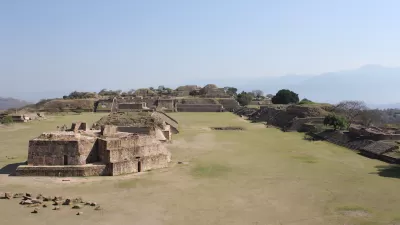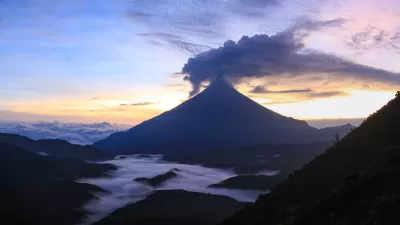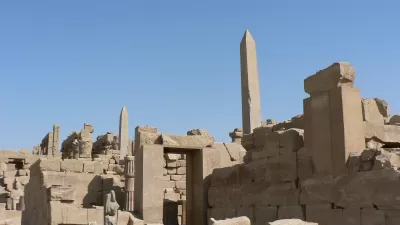Most developers dread finding archaeological remains. Normally it means months of delays and increased costs while archaeologists investigate the site. However, some savvy developers are turning archaeological finds into a marketing advantage.
Many developers "believe the discovery of bones will lead to the state or an Indian tribe seizing private land. Fearing that, some will probably order the bulldozers quietly to bury what they unearth."
"...Bloomington, a suburb of St George, has built a cul-de-sac around a huge boulder marked with petroglyphs-a model that will soon be followed by a developer near Salt Lake City. A site near Cortez, in Colorado, which is dotted with more than 200 Indian ruins, is being marketed as "America's first archaeological development": buyers can do their own excavations, but must bequeath what they find to a local museum. Perhaps the most extraordinary example is Mountain's Edge, a half-built suburb near Las Vegas, where an ersatz archaeological dig has been incorporated into a park. Clearly, if a site lacks history there is a need to invent it. In a fast-growing area where many buyers lack roots, a bit of local history may help sales."
As GPS and web-based maps proliferate, it becomes increasingly difficult to protect far-flung and lonely archeology sites from vandalism and theft. While "archaeology-themed suburbs" may be troubling to some, the "best chance of preserving America's archaeological heritage may be to surround it with houses."
FULL STORY: Grave goods

Alabama: Trump Terminates Settlements for Black Communities Harmed By Raw Sewage
Trump deemed the landmark civil rights agreement “illegal DEI and environmental justice policy.”

Planetizen Federal Action Tracker
A weekly monitor of how Trump’s orders and actions are impacting planners and planning in America.

The 120 Year Old Tiny Home Villages That Sheltered San Francisco’s Earthquake Refugees
More than a century ago, San Francisco mobilized to house thousands of residents displaced by the 1906 earthquake. Could their strategy offer a model for the present?

In Both Crashes and Crime, Public Transportation is Far Safer than Driving
Contrary to popular assumptions, public transportation has far lower crash and crime rates than automobile travel. For safer communities, improve and encourage transit travel.

Report: Zoning Reforms Should Complement Nashville’s Ambitious Transit Plan
Without reform, restrictive zoning codes will limit the impact of the city’s planned transit expansion and could exclude some of the residents who depend on transit the most.

Judge Orders Release of Frozen IRA, IIJA Funding
The decision is a victory for environmental groups who charged that freezing funds for critical infrastructure and disaster response programs caused “real and irreparable harm” to communities.
Urban Design for Planners 1: Software Tools
This six-course series explores essential urban design concepts using open source software and equips planners with the tools they need to participate fully in the urban design process.
Planning for Universal Design
Learn the tools for implementing Universal Design in planning regulations.
Clanton & Associates, Inc.
Jessamine County Fiscal Court
Institute for Housing and Urban Development Studies (IHS)
City of Grandview
Harvard GSD Executive Education
Toledo-Lucas County Plan Commissions
Salt Lake City
NYU Wagner Graduate School of Public Service





























